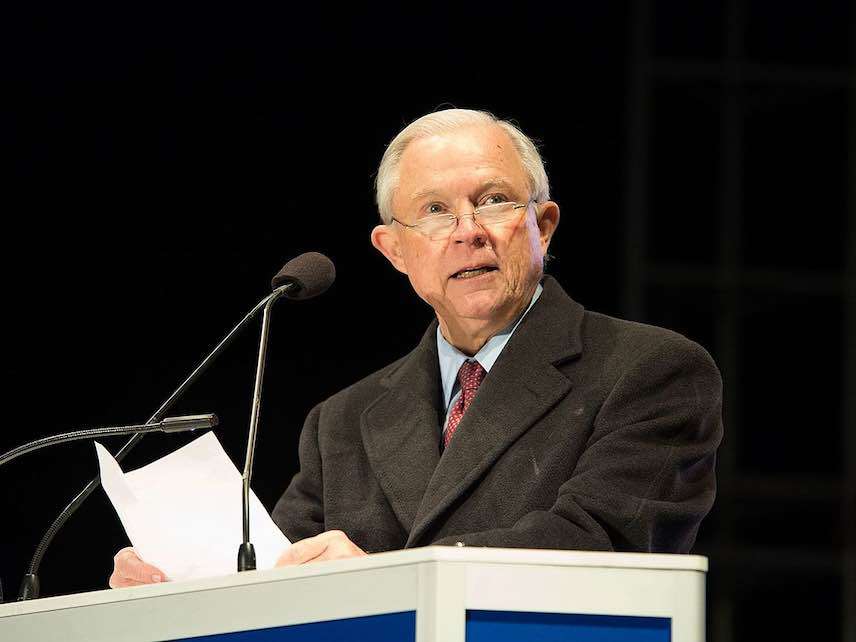Jeff Sessions Should Be Screaming Bloody Murder About a Potential Joe Arpaio Pardon
Jeff Sessions has been an opponent of clemency for nearly two decades. Will he make an exception for Sheriff Joe?

President Donald Trump did not pardon former Maricopa County Sheriff Joe Arpaio at his Arizona rally on Tuesday, but CNN reports that the paperwork and accompanying talking points are ready. Should he pardon Arpaio at some point in the near future, it would be both completely legal and an affront to everything his attorney general supposedly holds dear.
"One of the talking points is that Arpaio served his country for 50 years in the military, the Drug Enforcement Administration and as Arizona's Maricopa County sheriff," CNN's Kaitlan Collins reports, "and that it is not appropriate to send him to prison for 'enforcing the law' and 'working to keep people safe.'"
Arpaio is not facing six months behind bars for "enforcing the law" or "working to keep people safe," any more than drug dealers are sentenced to prison for "making people happy." Arpaio disregarded a judge's order and was convicted of contempt of court.* He did the crime, by his own logic and that of the U.S. Attorney General, and he should now do some time.
But if Trump decides to spare the 85-year-old Arpaio six months of incarceration—we won't know until October if he'll actually serve any time behind bars—he has that power. Yes, it would signal a break with historical precedent, but that's really the only constraint on executive clemency.
To get a sense of just how unusual an Arpaio pardon would be, let's look at the Office of the Pardon Attorney's policy:
Under the Department's rules governing petitions for executive clemency, an applicant must satisfy a minimum waiting period of five years before he becomes eligible to apply for a presidential pardon of his federal conviction. The waiting period begins to run on the date of the petitioner's release from confinement. Alternatively, if the conviction resulted in a sentence that did not include any form of confinement, the waiting period begins on the date of sentencing.
As for commutations—which is when president reduces a person's sentence and/or fines—here are the criteria for Obama's clemency initiative:
- They are currently serving a federal sentence in prison and, by operation of law, likely would have received a substantially lower sentence if convicted of the same offense(s) today.
- They are non-violent, low-level offenders without significant ties to large scale criminal organizations, gangs or cartels.
- They have served at least 10 years of their prison sentence.
- They do not have a significant criminal history.
- They have demonstrated good conduct in prison.
- They have no history of violence prior to or during their current term of imprisonment.
Arpaio does not fit any of the OPA's publicly available criteria for a commuted sentence or pardon. It has not been five years since his conviction or the completion of his sentence. The sentence he's most likely to receive is not excessively long.
What's more, Arpaio has refused to accept responsibility, considered fundamental to the application for clemency. In public statements and fundraising emails for the National Center for Police Defense he insists he did nothing wrong and blames his prosecution on politics.
If anyone in Trump's orbit should be discouraging him from pardonning Arpaio, it's Sessions.
When Pres. Bill Clinton pardoned financier Marc Rich in the final hours of his presidency, Rich had not even stood trial. He fled the U.S. in 1983 after being indicted for trading with Iran during the hostage crisis, and spent the rest of his life living comfortably abroad. During his absence, Rich's family in the U.S. funneled more than a million dollars to the Democratic National Committee, the senatorial campaign of Hillary Clinton, and the Clinton Presidential Library. When Clinton eventually pardoned him at the behest of Israel's government, the prosecutors who worked to indict Rich were understandably furious, as were many members of Congress.
"From what I've seen, based on the law of bribery in the United States, if a person takes a thing of value for himself or for another person that influences their decision in a matter of their official capacity, then that could be a criminal offense,'' Sen. Jeff Sessions told the New York Times in 2001.
One might think Sessions would feel similarly about the current president rewarding a campaign surrogate with a Get Out of Jail Free card.
Sessions also objected to the clemency initiative, which Obama launched in 2014 and continued through the end of his second term. This was the most systematic attempt to heal the wounds of a stupid war since President Jimmy Carter pardoned men who evaded the draft for Vietnam. Sessions, however, declared Obama's efforts to shorten insanely long drug sentences a betrayal of the American justice system.
"To unilaterally determine that a sentence was unjustified simply because the president disagrees with the underlying criminal justice policy is a thumb in the eye of the law enforcement officers, prosecutors, defense attorneys, judges, court and prison personnel who put time and resources into these cases," Sessions said in 2014.
Just a month ago, Sessions said he was committed to holding law-breaking cops accountable. "Just as I'm committed to defending law enforcement who lawfully have to use deadly force to defend themselves while engaged in their work," he told the National Organization of Black Law Enforcement Executives, "I will also use the power of the office I'm entrusted with to hold any officer responsible who violates the law."
If Arpaio is an exception to Sessions' position on executive clemency and holding criminal cops accountable, I can't wait to hear his explanation.
*CORRECTION: The original version of this article referred to Joe Arpaio as a felon. He was never convicted of a felony.
